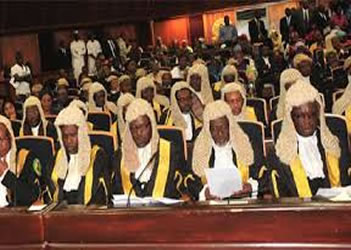CJN will now receive a monthly salary of N10 million, State Chief Justices N8 million
A national labor tribunal sitting in Abuja on Friday ordered the federal government to put in place mechanisms for the immediate review of salaries and allowances of bailiffs in Nigeria.
Judge Osatohanmwen Obaseki-Osaghae, who issued the order, found that the current salaries and allowances for judicial officers in the country are not only extremely low, but embarrassing.
Rendering judgment in a lawsuit brought against the Federal Government by Chief Sebastine Hon (SAN), Judge Obaseki-Osaghae ordered the Federal Government to commence a monthly payment of N10 million to the Chief Justice of Nigeria ( CJN), 9 million Naira to the other Supreme Court Justices, the President of the Court of Appeal, 9 million Naira while the other Justices of the Court of Appeal 8 million Naira, the judges in Head of Federal and State High Courts N8 million while Federal and State High Court Judges N7 million.
The judge ruled that the government's refusal to review the salaries and allowances of bailiffs for 14 years was unconstitutional, illegal and should be forced to do the necessary.
The court noted that the salaries of judges and magistrates had stagnated for more than 14 years and that, despite the increase in the workload of the judicial officers, they continued to suffer from the shortage because of their "salaries and extremely low compensation,” which the court describes as “very embarrassing.”
“There is no doubt from the evidence before this court that the salaries payable to judges and their terms of service have been significantly altered to their disadvantage. The judicial officers are daily impoverished by the devaluation of the necessary
“They have suffered financial hardship and embarrassment due to their low salary. It is a disgrace to the country. Despite this, our judges have continued to perform their statutory duties. of great injustice. How ironic," added Justice Obaseki-Osagie.
The court ordered that the order be served on the Revenue Mobilization and Taxation Commission (RMAFC) and the Attorney General of the Federation (AGF) and Minister of Justice, Abubakar Malami (SAN) and ordered awarded N1.5 million against RMAFC, AGF and the National Assembly, all of whom were named as defendants in the case.
Chief Sebastine Hon, who initiated the case, urged the court to compel the defendants to increase the salaries and allowances of the nation's judges.
In an affidavit in support of the initial subpoena, Hon said that as a jurist, "who has practiced at all levels of courts in Nigeria, I know that the poor remuneration of judicial officers affects seriously the quality of judgments and decisions these officers perform and discharge other duties associated with their duties."
He argued that the current economic reality of the country demands that the salaries and allowances of the country's judges be urgently improved.
The Complainant noted that the highest paid judicial officer in the country - the Chief Justice of Nigeria (CJN) - currently earns about 3.4 million naira per year, well below what such a officer in other countries.< /p>
Hon said in the affidavit that the paltry sums discouraged him from aspiring to become a judge.
Sebastine Hon added that "even foreigners who have been hired from time to time to coach Nigeria's national football teams earn more than Nigeria's bailiffs".
He urged the tribunal, inter alia, to declare that by a combined reading of the provisions of Article 6(1)(b) and (d) and Parts A and B of the First Schedule of the Mobilization of Revenue Allocations and Taxation Commission Act, Cap. R7, Laws of the Federation of Nigeria, 2004, it is unconstitutional for the 2nd Respondent (RMAFC) to refuse or neglect to revise upwards the salaries and allowances of bailiffs notwithstanding changing local socio-economic realities and international.
The plaintiff sought an order requiring the defendants to immediately activate measures to urgently review the remuneration of judicial officers, increasing that of the CJN to a minimum of 12 million naira per month, 11 million naira for other judges of the Supreme Court and the President of the Court of Appeal. ; N10 million for another Court of Appeal judge, the Chief Justice of the Federal High Court and the President of the National Labor Court (NIC).
Hon also urged the court to compel the defendants to increase the minimum monthly income of an NIC judge to 9 million naira; N8 million for Chief Justices of the States and Federal Capital Territory High Court, while other judges are entitled to N7 million.
YOU SHOULD NOT MISS THESE HEADLINES FROM THE NIGERIAN TRIBUNE

A national labor tribunal sitting in Abuja on Friday ordered the federal government to put in place mechanisms for the immediate review of salaries and allowances of bailiffs in Nigeria.
Judge Osatohanmwen Obaseki-Osaghae, who issued the order, found that the current salaries and allowances for judicial officers in the country are not only extremely low, but embarrassing.
Rendering judgment in a lawsuit brought against the Federal Government by Chief Sebastine Hon (SAN), Judge Obaseki-Osaghae ordered the Federal Government to commence a monthly payment of N10 million to the Chief Justice of Nigeria ( CJN), 9 million Naira to the other Supreme Court Justices, the President of the Court of Appeal, 9 million Naira while the other Justices of the Court of Appeal 8 million Naira, the judges in Head of Federal and State High Courts N8 million while Federal and State High Court Judges N7 million.
The judge ruled that the government's refusal to review the salaries and allowances of bailiffs for 14 years was unconstitutional, illegal and should be forced to do the necessary.
The court noted that the salaries of judges and magistrates had stagnated for more than 14 years and that, despite the increase in the workload of the judicial officers, they continued to suffer from the shortage because of their "salaries and extremely low compensation,” which the court describes as “very embarrassing.”
“There is no doubt from the evidence before this court that the salaries payable to judges and their terms of service have been significantly altered to their disadvantage. The judicial officers are daily impoverished by the devaluation of the necessary
“They have suffered financial hardship and embarrassment due to their low salary. It is a disgrace to the country. Despite this, our judges have continued to perform their statutory duties. of great injustice. How ironic," added Justice Obaseki-Osagie.
The court ordered that the order be served on the Revenue Mobilization and Taxation Commission (RMAFC) and the Attorney General of the Federation (AGF) and Minister of Justice, Abubakar Malami (SAN) and ordered awarded N1.5 million against RMAFC, AGF and the National Assembly, all of whom were named as defendants in the case.
Chief Sebastine Hon, who initiated the case, urged the court to compel the defendants to increase the salaries and allowances of the nation's judges.
In an affidavit in support of the initial subpoena, Hon said that as a jurist, "who has practiced at all levels of courts in Nigeria, I know that the poor remuneration of judicial officers affects seriously the quality of judgments and decisions these officers perform and discharge other duties associated with their duties."
He argued that the current economic reality of the country demands that the salaries and allowances of the country's judges be urgently improved.
The Complainant noted that the highest paid judicial officer in the country - the Chief Justice of Nigeria (CJN) - currently earns about 3.4 million naira per year, well below what such a officer in other countries.< /p>
Hon said in the affidavit that the paltry sums discouraged him from aspiring to become a judge.
Sebastine Hon added that "even foreigners who have been hired from time to time to coach Nigeria's national football teams earn more than Nigeria's bailiffs".
He urged the tribunal, inter alia, to declare that by a combined reading of the provisions of Article 6(1)(b) and (d) and Parts A and B of the First Schedule of the Mobilization of Revenue Allocations and Taxation Commission Act, Cap. R7, Laws of the Federation of Nigeria, 2004, it is unconstitutional for the 2nd Respondent (RMAFC) to refuse or neglect to revise upwards the salaries and allowances of bailiffs notwithstanding changing local socio-economic realities and international.
The plaintiff sought an order requiring the defendants to immediately activate measures to urgently review the remuneration of judicial officers, increasing that of the CJN to a minimum of 12 million naira per month, 11 million naira for other judges of the Supreme Court and the President of the Court of Appeal. ; N10 million for another Court of Appeal judge, the Chief Justice of the Federal High Court and the President of the National Labor Court (NIC).
Hon also urged the court to compel the defendants to increase the minimum monthly income of an NIC judge to 9 million naira; N8 million for Chief Justices of the States and Federal Capital Territory High Court, while other judges are entitled to N7 million.
YOU SHOULD NOT MISS THESE HEADLINES FROM THE NIGERIAN TRIBUNE
What's Your Reaction?






















